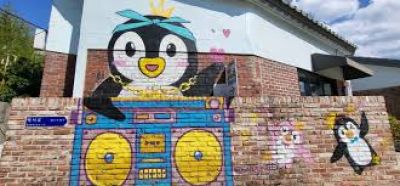

Immerse yourself in the rich history of Yangnim-dong in Gwangju, a place that tells the story of a bygone era. As you stroll through the village, you'll discover historical landmarks, traditional Korean houses, and various monuments that reflect the cultural heritage of the area. Take the opportunity to learn about the role Yangnim-dong played in the nation's struggle for democracy and how it has preserved its unique character amidst modernization. With vintage-style streets and ambient cafes, you can savor the essence of old Gwangju. The tour includes a visit to the Yangnim-dong Cathedral and the former Gwangju Hospital, enhancing your understanding of the deep-rooted historical significance of the village.
Yangnim-dong Penguin Village is a quirky, artistic hub where creativity flourishes in every corner. Named after the waddling walk of residents going up the hill, the village is adorned with penguin-themed artworks and installations. Visitors can take part in an Art Walk, exploring the various murals, sculptures, and galleries that bring color and life to the streets. As you meander through the narrow alleys, you'll be enveloped by an atmosphere of inspiration, showcasing local artists' talents and the community's dedication to art. The Penguin Village Art Walk is not just a feast for the eyes but also a testament to the transformative power of art in revitalizing urban spaces.
In Yangnim-dong Penguin Village, the Ceramic Workshop Experience invites guests to get their hands dirty and unleash their creativity. This workshop offers the chance to learn about Korean ceramic traditions and to make your unique pottery pieces. Expert artisans guide participants through the process of shaping, glazing, and firing their creations, making it an educational and hands-on experience. Suitable for all ages, the workshop not only provides a fun activity but also allows you to take home a personalized memento of your time spent in the village. It's an excellent way for art lovers to connect with the local culture and artistry.
Explore the hidden gems of Yangnim-dong as you hop from one vintage shop to another in search of unique finds. These shops are treasure troves of history, packed with a variety of retro clothing, accessories, decor, and memorabilia. Each store has its personality and collection, mirroring the eclectic nature of Penguin Village. As you rummage through the items, you'll encounter pieces that transport you back in time, making it a nostalgic journey for vintage lovers. Shop owners often have fascinating stories about their merchandise, enriching your shopping experience with personal touch and historical anecdotes.
The Creative Studio in Yangnim-dong Penguin Village is a vibrant space where local artists and performers come together to showcase their talents. Here, visitors can experience a variety of cultural performances ranging from music and dance to theater and spoken word. The intimate setting allows for an immersive experience where audience members can connect with the artists on a deeper level. Performances often incorporate elements of Korean tradition with contemporary expressions, reflecting the dynamic cultural tapestry of the area. Attending an event at the Creative Studio is a splendid way to support local artists while enjoying unique and thought-provoking entertainment.
Yangnim-dong is home to a variety of thematic and cozy cafes that offer refuge and relaxation amidst the village's cultural landscape. Café hopping is a popular activity where visitors can unwind over a delicious cup of coffee or tea while soaking in the ambiance of each unique establishment. Some cafes feature art exhibitions, bookshelves lined with literature, and antiques, providing a soothing environment to rest or catch up with friends. Each café has its character, whether it's a quiet, hidden gem or a bustling spot with views of the village. Indulging in the café culture of Yangnim-dong is a perfect way to recharge before continuing your exploration.
Yangnim-dong is not only a haven for art lovers but also a paradise for photography enthusiasts. The village's murals and street art offer countless opportunities to capture the essence of the region's creative soul through the lens. Visitors can embark on a self-guided tour, photographing the vivid and intricate artworks that decorate the exteriors of homes and businesses. This activity allows for the exploration of urban art beyond the canvas and the creation of stunning visual narratives that tell the story of Penguin Village. Whether you're an amateur or a professional photographer, you'll find inspiration at every turn.
The culinary scene in Yangnim-dong Penguin Village offers a mouthwatering journey through traditional Korean cuisine. Embark on a tasting adventure and explore the variety of local dishes available in the village's quaint eateries. From piping hot bowls of kimchi jjigae (kimchi stew) to savory pajeon (Korean pancake), each meal promises a symphony of flavors and textures. Tasting traditional cuisine not only satisfies your palate but also provides a deeper understanding of Korean culture and the regional nuances of its food. It's an essential experience for foodies looking to delve into the authentic tastes of Korea.
While exploring Yangnim-dong, take the opportunity to visit the Gwangju National Museum, which offers a glimpse into the historical and artistic heritage of the Jeollanam-do region. The museum features a rich collection of artifacts, from ancient pottery and Buddhist art to calligraphy and paintings. The exhibitions are thoughtfully curated to provide insights into the region's past, its cultural evolution, and its artistic achievements. The Gwangju National Museum is a treasure trove for history buffs and a source of education for visitors of all ages. Engaging with the exhibits is both enlightening and entertaining, making it a worthwhile visit.
The May 18th National Cemetery is a solemn and significant site that bears witness to the tragic events of the Gwangju Uprising in 1980. Located within the vicinity of Yangnim-dong, the cemetery is a place of remembrance and reflection. Visitors can pay their respects to the victims and learn about the struggle for democracy and human rights in South Korea. The beautifully maintained grounds and memorial museum provide context and education on the impact of the uprising, making it a place of both historical importance and personal contemplation. This experience is a poignant reminder of the past and its influence on the present.
